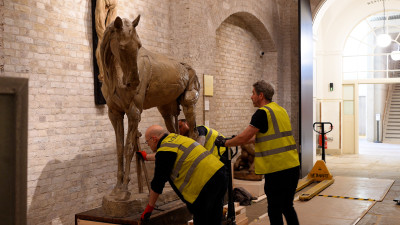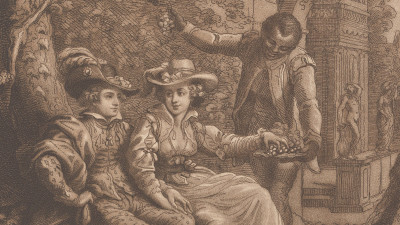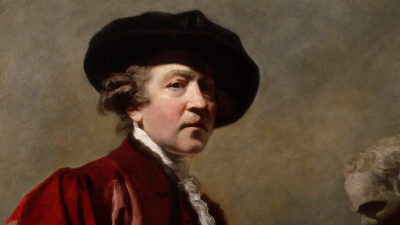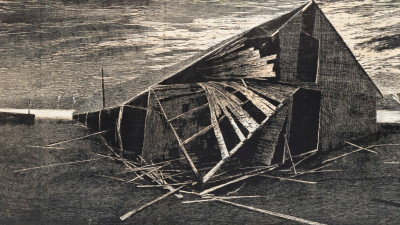
Gérard Edelinck, The Battle of Anghiari, ca. 1660.
Engraving. 450 mm x 603 mm. © Photo: Royal Academy of Arts, London.
This image is released under Creative Commons CC-BY-NC-ND
To licence this image for commercial purposes, contact our Picture Library at picturelibrary@royalacademy.org.uk
The Battle of Anghiari, ca. 1660
Gérard Edelinck (1640 - 1707)
RA Collection: Art
This print depicts three men on war-horses engaged in a ferocious conflict for possession of the standard that would mark the battle's victor. Gerard Edelinck's print shows the Battle of the Standard, the central section of an ambitious mural project commissioned from Leonardo da Vinci to commemorate the Florentine victory over the Milanese army during the Battle of Anghiari in 1440.
Leonardo's design was intended to decorate a wall in the Sala del Gran Consiglio (Great Council Hall) of the Palazzo della Signoria in Florence - together with a facing fresco by Michelangelo depicting the Battle of Cascina. Prior to their execution, Leonardo and Michelangelo's two full-scale preparatory cartoons were exhibited and much admired by the younger generation of artists and acclaimed by Benvenuto Cellini "school for the world" (scuola del mondo). None survived the test of time.
Michelangelo abandoned the project after the completion of his cartoon. Leonardo began executing the composition adopting an experimental technique inspired by the Roman method of encaustic painting which proved to be disastrous. This involved using a ground of heated beeswax to which oil pigments were applied. To quicken the drying time of the completed sections, Leonardo installed braziers under the fresco. But, as described by Vasari, the wax-based pigments could not sustain the heat and the fresco "began to drip, in such a way, that very quickly, Leonardo abandoned it". Leonardo's battle scene had so deteriorated by c. 1563 that Vasari covered the walls with a monumental cycle of battle scenes from Florentine history.
Only a few extant autograph sketches and drawings document Leonardo's design, while the battle composition is preserved in later copies such as the Rubens drawing now at the Louvre from which Edelinck's print is derived and the Ruccellai drawing reproduced in a plate in the Etruria Pittrice (1791-95). These remain fundamental visual evidence of Leonardo's grand scheme.
Object details
450 mm x 603 mm
Associated works of art
1 results
Start exploring the RA Collection
- Explore art works, paint-smeared palettes, scribbled letters and more...
- Artists and architects have run the RA for 250 years.
Our Collection is a record of them.




